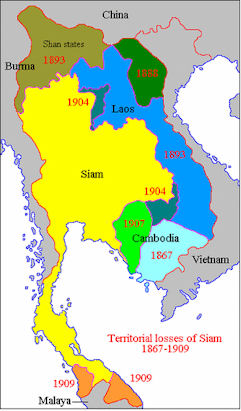

Zitierweise / cite as:
Payer, Alois <1944 - >: Chronik Thailands = กาลานุกรมสยามประเทศไทย. -- Chronik 1896 (Rama V.). -- Fassung vom 2017-02-06. -- URL: http://www.payer.de/thailandchronik/chronik1896.htm
Erstmals publiziert: 2013-10-01
Überarbeitungen: 2017-02-06 [Ergänzungen] ; 2017-01-28 [Ergänzungen] ; 2017-01-18 [Ergänzungen] ; 2016-11-02 [Ergänzungen] ; 2016-10-28 [Ergänzungen] ; 2016-09-18 [Ergänzungen] ; 2016-04-26 [Ergänzungen] ; 2015-12-07 [Ergänzungen] ; 2015-11-24 [Ergänzungen] ; 2015-10-04 [Ergänzungen] ; 2015-05-10 [Ergänzungen] ; 2015-04-21 [Ergänzungen] ; 2015-03-22 [Ergänzungen] ; 2015-01-10 [Ergänzungen] ; 2014-12-31 [Ergänzungen] ; 2014-11-29 [Ergänzungen] ; 2014-03-07 [Ergänzungen] ; 2014-01-01 [Ergänzungen] ; 2013-12-06 [Ergänzungen]
©opyright: Dieser Text steht der Allgemeinheit zur Verfügung. Eine Verwertung in Publikationen, die über übliche Zitate hinausgeht, bedarf der ausdrücklichen Genehmigung des Herausgebers.
Dieser Text ist Teil der Abteilung
Thailand von
Tüpfli's Global Village Library
ช้างตายทั้งตัวเอาใบบัวปิดไม่มิด
|
Gewidmet meiner lieben Frau Margarete Payer die seit unserem ersten Besuch in Thailand 1974 mit mir die Liebe zu den und die Sorge um die Bewohner Thailands teilt. |
|
Bei thailändischen Statistiken muss man mit allen Fehlerquellen rechnen, die in folgendem Werk beschrieben sind:
Die Statistikdiagramme geben also meistens eher qualitative als korrekte quantitative Beziehungen wieder.
|
1896
Abb.: Medizinstudenten beim Studium von Heilpflanzen unter Anleitung von Phra Advidhyakorn, Bangkok, 1896
Abb.: Medizinstudenten beim Studium der Anatomie unter Anleitung von Phra Advidhyakorn, Bangkok, 1896
ca. 1896
Abb.: Frauen, Kao Phanom (เขาพนม), ca. 1896
Abb.: Lage von Kao Phanom (เขาพนม)
[Bildquelle: OpenStreetMap. -- Creative Commons Lizenz (Namensnennung, share alike)]
vor 1896
"Prince Sanphasitthiprasong [พลตรี พระเจ้าบรมวงศ์เธอ กรมหลวงสรรพสิทธิประสงค์, 1857 - 1922], the High Commissioner of Nakhon Ratchasima [นครราชสีมา], went a step further, and showed how the government could administer the whole country with the cooperation of the people. The Prince tried to apply the British administration of Burma at the village level, which he had seen at first hand, to the villages around his city of residence. He ordered villagers to elect village elders, kamnan [กำนัน], who, except to the fact that they were not paid by the government, resembled the Burmese village headmen, or thugyis [သူကြီး]. The village elders were made responsible for the registration of births and deaths, marriages and divorces, immigration and emigration, the inspection of fire arms, the reports of crimes, the apprehension of criminals, and the settlement of minor disputes. Although this experiment was conducted only on a limited scale around Nakhon Ratchasima, and although it was largely a failure owing to the nearly complete lack of education of the village elders, it was nevertheless a prototype of the village administration of the following period." [Quelle: Tej Bunnag [เตช บุนนาค] <1943 - >: The provincial administration of Siam from 1892 to 1915 : a study off the creation, the growth, the achievements, and the implications for modern Siam, of the ministry of the interior under prince Damrong Rachanuphap. -- Diss. Oxford : St. Anthonys College, Michaelmas Term 1968. -- 429 S., Schreibmaschinenschrift. -- S. 110f. -- Faire use]
1896 - 1897
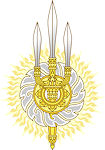

Kronprinz Vajiravudh (วชิราวุธ, 1881 - 1925) erhält in Frimley Park militärischen Unterricht durch Colonel C. V. Hume.
Abb.: Lage von Frimley Park
[Bildquelle: OpenStreetMap. -- Creative Commons Lizenz (Namensnennung, share alike)]
1896
Folgende Departments werden dem Innenministerium unterstellt
- Forstdepartment (กรมป่าไม้)
- Bergbaudepartment (กรมโลหะกิจ)
1896/1926
Steuereinnahmen:
Abb.: Steuereinnahmen 1896 und 1926 (in Baht und in Prozent der Gesamteinnahmen des Staats)
[Datenquelle: Thompson, Virginia <1903 - 1990>: Thailand the new Siam. -- New York : Macmillan, 1941. -- S. 550]
1896
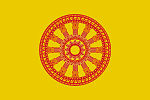
Bau von Wat Chong Sung (วัดจองสูง) in Mae Sariang (แม่สะเรียง).
Abb.: Lage von Mae Sariang (แม่สะเรียง)
[Bildquelle: OpenStreetMap. -- Creative Commons Lizenz (Namensnennung, share alike)]
1896 - 1910/11

Prinz Prisdang Jumsai (พระอง์คเจ้า ปฤษฎาง์ค ชุมสาย, 1851 - 1932), ehemals Gesandter Siams für die europäischen Länder und die USA, ist buddhistischer Mönch in Ceylon. Sein Ordensname ist ป. ชินวรวงศ์. Von 1905 - 1910 ist er Abt von Dipaduttamarama Purana Thai Raja Maha Viharaya (วัดทีปทุตตมาราม) in Colombo.
Abb.: Prinz Prisdang als Mönch พระชินวรวงศ์
1896
- Regelung der Gerichtsverfahren bei Zivilprozessen
- Vorläufiges Gesetz über Gerichtsverfahren bei Strafprozessen
- Vorläufige Gerichtsverfassung
- Gesetz über Pfandhäuser

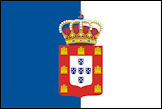
"Of the Regulations passed by the Legislative Council, that with regard to the Pawnshops has been obstructed for nearly two years by the Consular body, of whom a small minority, consisting of the French and Portuguese representatives, refused to signify their approval of it. The chief source of difficulty was the amount of the fee. The Siamese proposed that the not exorbitant amount of 100 ticals (6
l. 13s. 4d.) should be required of all pawnbrokers, for the unanswerable reason that they considered there should be some restraint put on pawnbroking. The number of pawnshops in Bangkok has for years given rise to complaint and dissatisfaction among Europeans of all classes and nationalities, on the ground of the direct encouragement given by them, in the absence of all restrictions, to robbery and thieving of every kind. Now that the Siamese attempt to improve matters, those who are foremost in blaming them for their general inaction are the most prominent obstructionists.The objectors regard it as their duty rather to encourage their subjects to make money than to consider the good of the community, or of the country to which they are accredited.
The Consular body agreed to require a European Inspector of Pawnshops, and in this respect the Siamese Government were perfectly prepared to meet them. But the objectors further demanded that each nationality should have an inspector of its own—that for instance the thirty or forty Macao Chinamen, who with the exception of a few half-castes are almost the only persons in Siam whom the Portuguese Consul has to protect, should have a European Portuguese Inspector of their own.
The objectors even went so far at first as to want to redraft the whole regulation, until their confreres pointed out that their duties were fortunately not to legislate for Siam, but merely to guard against the possible curtailment of treaty rights."
[Quelle: Smyth, H. Warington (Herbert Warington) <1867-1943>: Five years in Siam : from 1891 to 1896. -- London : Murray, 1898. -- 2 Bde. : Ill ; 21 cm. -- Bd. 2. -- S. 252f.]
1896
Einsetzung von drei Gerichtskommissionen, die ihre Aufgaben innert 12 Monaten erfüllen müssen:
- Kommission zur Beendigung laufender Verfahren
- Kommission zur Erledigung noch anstehender Verfahren
- Kommission zue Erledigung von Verfahren, deren Dokumente verlorengegangen sind oder (z.B. durch Termiten) zerstört wurden.
Diese drei Kommissionen erledigen ca. 2000 Fälle.
1896
Einsetzung einer Kommission zur Revision des Strafgesetzbuchs.
1896

Die französischen katholischen Missionare betreiben
- 25 Knabenschulen mit 1640 Schülern
- 23 Mädchenschulen mit 1400 Schülerinnen
- 18 Waisenhäuser mit 620 Kindern
- 4 Krankenhäuser
- 3 Apotheken
1896

Gründung der protestantischen Missionsstation in Nan (น่าน)
Abb.: Lage von Nan (น่าน)
[Bildquelle: OpenStreetMap. -- Creative Commons Lizenz (Namensnennung, share alike)]
1896
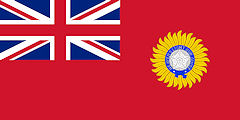
Wert des gesamten Handels in Nan (น่าน), vorwiegend britische Güter: Rs. 36.000 (ca. 1.800 £).
1896
Bau des Ban Sao Nak (บ้านเสานัก) in Lampang (ลำปาง).
Abb.: Lage von Lampang (ลำปาง)
[Bildquelle: OpenStreetMap. -- Creative Commons Lizenz (Namensnennung, share alike)]
Abb.: Ban Sao Nak (บ้านเสานัก), 2008
[Bildquelle: Joep de Graff. -- http://www.flickr.com/photos/63869814@N00/2755955561. -- Zugriff am 2013-06-27. -- Creative Commons Lizenz (Namensnennung, keine kommerzielle Nutzung, keine Bearbeitung)]
Abb.: Ban Sao Nak (บ้านเสานัก), 2008
[Bildquelle: Joep de Graff. -- http://www.flickr.com/photos/63869814@N00/2756784632. -- Zugriff am 2013-06-27. -- Creative Commons Lizenz (Namensnennung, keine kommerzielle Nutzung, keine Bearbeitung)]
1896/1897
Vorschläge zur Verbesserung des Reisanbaus:
"In 1896-97 Yai Suvaphan Sanitwongse [หม่อมราชวงศ์ ใหญ่สุวพันธุ์ สนิทวงศ์, 1863 - 1926] suggested that Thailand imitate the Japanese and promote irrigation and the use of fertilizer, develop better implements and pumps, work on pure line seed selection for rice to reverse the seed quality decline caused by* the mixing of seed on farms, and select better seed varieties for tobacco, cotton, coffee, and other crops. He recommended that the Thais, like the Japanese, harness more animal, water, and steam power, establish an extension service, reform commercial law, start an import substitution industry for gunny bags, and standardize the weights and measures used in Thailand (r.5. k.s. 1/4,1896-97)." [Quelle: Feeny, David <1948 - >: The political economy of productivity : Thai agricultural development 1880 - 1975. -- Vancouver : University of British Columbia Press, 1982. -- (Asian studies monographs ; 3). -- Zugl.: Diss. Univ. of Wisconsin-Madison. -- S. 51]
1896
Auf Anregung von Königin Saovabha Bongsri (เสาวภาผ่องศรี) Gründung der School of Obstetrics and Nursing (การพยาบาลสูติศาสตร์) am Siriraj Hospital (ศิริราชพยาบาล).
1896

Rama V. vergibt jährlich Stipendien zum Studium im Ausland
"Since the institution by his Majesty the King in the year R.S. 118 (1896) of an annual open competitive examination for scholarships to be held abroad, 29 scholarships have been awarded. In addition, other students of approved ability have been selected for special studies abroad. The result of this wise policy is becoming every year more evident in the valuable work being done by those students who have returned to serve their country. During the last ten years 38 of these students have returned, only 3 of whom were reported on as not having been satisfactory. There was 1 death, and 3 returned on account of ill-health. The remainder finished their courses of study with credit."
[Quelle: W. G. Johnson in: Twentieth century impressions of Siam : its history, people, commerce, industries, and resources / ed. in chief: Arnold Wright. -- London [etc.] : Lloyds, 1908. -- S. 234.]
1896- 1900

George Greville ist britischer Minister Resident and Consul-General.
1896 - 1899

Der Brite Alfred Mitchell-Innes (1864 – 1950) wird Finanzberater der Regierung.
"Alfred Mitchell-Innes (30 June 1864 – 13 February 1950) was a British diplomat, economist and author. He had the Grand Cross of the Order of Medjidieh ( مجیدی نشانی) conferred upon him by Abbas II (عباس حلمي باشا), Khedive (خدیو) of Egypt. Family
The youngest child of Alexander Mitchell-Innes (1811–1866) of Ayton, and Whitehall (near Chirnside), Berwickshire, by his second spouse Fanny Augusta (1821–1902), daughter of James Vine, in Puckaster, Isle of Wight, Alfred was born at 2 Forres Street, Edinburgh. He married (her second marriage) in 1919, Eveline (d. December 28, 1946), daughter of Sir William Miller, 1st Baronet of Manderston, Berwickshire.
CareerEducated privately, he entered the British Diplomatic Service in 1890 and was appointed to Cairo the next year. In 1896 he became financial advisor to Chulalongkorn the Great (Rama V), King of Siam. In 1899 he was appointed Under-Secretary of State for Finance in Egypt, and was Counselor at the British Embassy in Washington, D.C. from 1908 to 1913. He was Minister to Uruguay from 1913 to 1919, after which he retired.
While in Washington, he wrote two articles on money and credit for The Banking Law Journal. The first, 'What is Money?', received an approving review from John Maynard Keynes (1883 - 1946),[1] which led to the publication of the second, 'Credit Theory of Money'.[2] Long forgotten and rediscovered decades later, the articles have been praised as "the best pair of articles on the nature of money written in the twentieth century".[3]
In retirement he joined Bedford Town Council, serving twice: from 1921 to 1931 and from 1934 to 1947."
[Quelle: http://en.wikipedia.org/wiki/Alfred_Mitchell-Innes. -- Zugriff am 2014-11-26]
1896

Aus britisch Indien werden in Siam 2.800 Sikh und Afghanen als Polizisten angestellt. Auch 8 britische Polizeioffiziere kommen in den Dienst Siams.
1896

Aus dem Tagebuch des in Siam tätigen kanadischen Eisenbahningenieurs Henry Gittins (1858 - 1937):
Über eine Kremation in Bangkok:
"The whole business is a semi-religious circus sort of an arrangement. The bodies awaiting cremation were placed in coffins covered with gold leaf, highly decorated and surrounded with flowers, raised up on a high dais under a temporary sort of temple built of bamboo and white cotton. Candles burning all around and priests chanting and praying with occasional mourners going in to have a final audience. Outside were Chinese theatres, Siamese lakhons [ละคร] (dance plays) and sundry other hawkers - a kind of all the fun of the fair." [Zitiert in: Gittins, Paul <1964 - >: On track : Henry Gittins, railway pioneer in Siam and Canada. -- Bangkok : River, 2014. -- 151 S. : Ill. ; 21 cm. -- ISBN 978-616-7339-42-9. -- S. 62. -- Fair use]
1896 - 1899-12-07

Sir Charles Bullen Hugh Mitchell (1836 - 1899) ist British High Commissioner in Malaya
Abb.: Sir Charles Bullen Hugh Mitchell , 1886
[Bildquelle: Wikimedia. -- Public domain]
1896

Der chinesische Gelehrte Liang Qichao (梁啟超, 1873 - 1929) über Siam:
"Siam lies between Burma and Annam, as thin as a piece silk, and yet she was roused to action and proudly she still stands." [Zitiert in: Batson, Benjamin Arthur <1942 - >: The end of the absolute monarchy in Siam. -- Singapore : Oxford Univ. Pr., 1984. -- 349 S. : Ill. ; 22 cm. -- (Southeast Asia publications series ; no. 10). -- ISBN 0-19-582612-4. -- S. 1]
1896

Es erscheint:
Choo <Nai>: Krämmar Bhasa-Yeorman [แกรมมัรภาษาเยอรมัน] : (Siamesisch-Deutsche Grammatik) / 1. -- Leipzig : Drugulin, 1896. - 132 S.
1896
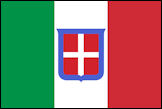
Der italienische Arzt Scipione Riva-Rocci (1863 - 1937) beschreibt auf einem Ärztekongress die von ihm verbesserte moderne Form eines Blutdruckmessgeräts.
Abb.: Riva-Roccis Sphygmanometer (Blutdruckmessgerät), 1896
1896
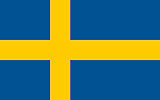
Der schwedische Wissenschaftler Svante Arrhenius (1859 - 1927) quantifiziert den Treibhauseffekt (greenhouse effect). Schon 1824 hat der französische Mathematiker Jean-Baptiste Joseph Fourier (1768 - 1830) den Effekt vermutet. 1859 brachte der irische Physiker Joseph Tyndall (1820 – 1893) den experimentellen Nachweis. 1901 verwendet der schwedische Metorologe Nils Gustaf Ekholm (1848 – 5 April) dafür erstmals die Bezeichnung greenhouse effect.
Abb.: Der Treibhauseffekt
[Bildquelle: US EPA / Wikimedia. -- Public domain]
1896

Die deutsche Firma Mauser produziert erstmals die Selbstladepistole Mauser C96. Sie ist bei Militärs äußerst beliebt und wird bis 1937 in aller Welt Nachgebaut.
Abb.: Mauser C96 M1916 "Red 9"
[Bildquelle: M62/Wikimedia. -- GNU FDLicense]
1896

Abb.: Produktionsprogramm der Daimler-Motoren-Gesellschaft Cannstadt (Württemberg, Deutschland) 1896
1896

Berlin: erste Lichtwerbung (Leuchtreklame) Deutschlands
Abb.: Lichtwerbung (Leuchtreklame), Bangkok 2009
[Bildquelle: Natt Muangsiri. -- http://www.flickr.com/photos/37510490@N02/3798773550. -- Zugriff am 2013-09-18. -- Creative Commons Lizenz (Namensnennung, keine kommerzielle Nutzung)]
1896 - 1907

Pestepidemie in Indien: über 2 Mio. Tote. Die Pest kommt wahrscheinlich von Hong Kong (China).
1896-01-08

Die Zeitung Malay Daily Chronicle (?) über die malaiischen Gebiete Siams:
[The Siamese peninsular states are] "egregiously misgoverned. The people are oppressed, agriculture and commerce are pursued under every possible difficulty and communications hardly exist. Siam, as everybody knows, has completely ceased to exercise any decent authority over the remote parts of its kingdom and indeed, in most Malay states its authority has always been repudiated the moment the king’s vessel was out of sight." [Zitiert in: Mackay, Colin <1936 - >: A history of Phuket and the surrounding region. -- Bangkok : White Lotus, 2013. -- 438 S. : Ill. ; 25 cm. -- ISBN 978-974-480-195-1. -- S. 295]
1896-01-15


Unterzeichnung der Declaration between Great Britain and France with regard to the Kingdom of Siam and other matters. Darin anerkennen beide Staaten Siam als Pufferstaat zwischen ihrem kolonialen Vordringen. Als Pufferstaat wird aber nur das Kernland - die Chao-Phraya-Ebene (แม่น้ำเจ้าพระยา) - anerkannt, nicht die westlichen und östlichen Landesteile.
Abb.: Anlage zur Anglo-French Declaration: Grenze des Pufferstaats
"The Anglo-French Declaration of London, 15 January 1896
The Governments of France and Great Britain engage to one another that neither of them will, without the consent of the other, in any case, or under any pretext, advance their armed forces into the region which is comprised in the basins of the Petchaburi [แม่น้ำเพชรบุรี ], Meiklong [Mae Klong - แม่น้ำแม่กลอง], Menam [Chao Phraya - แม่น้ำเจ้าพระยา] and Bang Pa Kong [แม่น้ำบางปะกง] (Petriou [Paed Riu - แปดริ้ว = Chachoengsao - ฉะเชิงเทรา]) rivers and their respective tributaries, together with the extent of coast from Muang Bang Tapan to Muong Pase, the basin of the rivers on which those two places are situated, and the basins of the other rivers, the estuaries of which are included in that coast; and including also the territory lying to the north of the basin of the Menam, and situated between the Anglo-Siamese frontier, the Mekong river [แม่น้ำโขง / ແມ່ນ້ຳຂອງ], and the eastern watershed of the Me Ing [แม่น้ำอิง]. They further engage not to acquire within this region any special privilege or advantage which shall not be enjoyed in common by, or equally open to, France and Great Britain and their nationals and dependents.These stipulations, however, shall not be interpreted as derogating from the special clauses which, in virtue of the treaty concluded on the 3rd October 1893, between France and Siam, apply to a zone of 25 kilom. on the right [West] bank of the Mekong and to the navigation of that river.
Nothing in the foregoing clause shall hinder any action on which the two powers may agree and which they shall think necessary in order to uphold the independence of the Kingdom of Siam. But they engage not to enter into any separate agreement permitting a third Power to take any action from which they are bound by the present Declaration themselves to abstain.
From the mouth of the Nam Huok northwards as far as the Chinese frontier, the thalweg of the Mekong shall form the limit of the possessions or spheres of influence of France and Great Britain. It is agreed that the nationals and dependents of each of the two countries shall not exercise any jurisdiction or authority within the possessions or spheres of influence of the other. The police of the islands in this part of the river which are separated from the British shore by a branch of the river shall, so long as they are thus separated, be intrusted to the French authorities. The fishery shall be open to the inhabitants of both banks.
[Clauses IV, V and VI make provision for sharing current and future privileges in Yunnan [雲南] and Szechouen [Sichuan - 四川
], for delimiting the region west of the lower Niger, and for revising the Anglo-Tunisian agreement of 1875.]"[Zitiert in: Tuck, Patrick J. N.: The French wolf and the Siamese lamb : the French threat to Siamese independence, 1858-1907. -- Bangkok : White Lotus, 1995. -- 434 S. : Ill. ; 22 cm. -- ISBN 974-8496-28-7. -- S. 321]
Der britische Premierminister, Robert Arthur Talbot Gascoyne-Cecil, 3. Marquess of Salisbury (1830 - 1903) erklärt zur Declaration (Teile der Erklärung werden am 1896-01-22 in The Times <London> veröffentlicht):
"It might be thought that because we have engaged our-selves, and have received the engagement of France, not under any circumstances to invade this territory, that therefore we are throwing doubt upon the complete title and rights of the Siamese to the remainder of their kingdom, or, at all events, treating those rights with disregard. Any such interpretation would entirely misrepresent the intention with which this agreement has been signed. We fully recognise the rights of Siam to the full and undisturbed enjoyment, in accordance with long usage or with existing treaties, of the entire territory comprised within her dominions ; and nothing in our present action would detract in any degree from the validity of the rights of the King of Siam to those portions of his territory which are not affected by this treaty. We have selected a particular area for the stipulations of this treaty, not because the title of the King of Siam is less valid, but because it is the area which affects our interests as a commercial nation. The valley of the Menam is eminently fitted to receive a high industrial development. Possibly in course of time it may be the site of lines of communication which will be of considerable importance to neighbouring portions of the British Empire. There seems every prospect that capital will flow into this region if reasonable security is offered for its investment, and great advantage would result to the commerce and industry of the world, and especially of Great Britain, if capitalists could be induced to make such an application of the force which they command. But the history of the region in which Siam is situated has not in recent years been favourable to the extension of industrial enterprise, or to the growth of that confidence which is the first condition of material improvement. A large territory to the north has passed from the hands of the Burmese Government to those of Great Britain. A large territory to the east has passed from the hands of its former possessors to those of France. The events of this recent history certainly have a tendency to encourage doubts of the stability of the Siamese dominion ; and without in any degree sharing in these doubts, or admitting the possibility within any future with which we have to deal of the Siamese independence being compromised, her Majesty's Government could not but feel there would be an advantage in giving some security to the commercial world that in regard to the region where the most active development is likely to take place no further disturbances of territorial ownership are to be apprehended. . . . Her Majesty's Government hope that the signature of this agreement will tend to foster the industrial growth of all these extensive districts ; and they have been sufficiently impressed with this belief to be willing to attest it by admitting the French claims to the ownership of the Mong Hsing [Muang Sing - ເມືອງສີງ] district of Keng Cheng [Chiang Khaeng], a triangular portion of territory on the eastern side of the Upper Mekong. Its extent and intrinsic value are not large, and, on account of its unhealthy character, it has no great attractions for Great Britain, though her title to it as formerly tributary to Burmah appears to us evidently sound ; but its retention by her might prove a serious embarrassment to the cheap and effective administration by France of her possessions in that neighbourhood." [Zitiert in: Twentieth century impressions of Siam : its history, people, commerce, industries, and resources / ed. in chief: Arnold Wright. -- London [etc.] : Lloyds, 1908. -- 302 S. : Ill. ; 31 cm.. -- S. 80f.]
Abb.: Lage von Mong Hsing [Muang Sing - ເມືອງສີງ]
[Bildquelle: OpenStreetMap. -- Creative Commons Lizenz (Namensnennung, share alike)]Die französischen Imperialisten in Indochine nenne das Abkommen
"un Sedan extrême-oriental" [Zitiert in: Tuck, Patrick J. N.: The French wolf and the Siamese lamb : the French threat to Siamese independence, 1858-1907. -- Bangkok : White Lotus, 1995. -- 434 S. : Ill. ; 22 cm. -- ISBN 974-8496-28-7. -- S. 383, Anm. 122]
Anm.: "Die Schlacht von Sedan fand am 1. September 1870 im Deutsch-Französischen Krieg statt. Mit der Kapitulation der französischen Truppen und der Gefangennahme des französischen Kaisers Napoléon III. am 2. September war sie vorentscheidend für den Ausgang des Krieges." (Wikipedia)
Abb.: "Übergabe des Kaisers Napoleon III. an den König Wilhelm von Preußen zu Sedan, Frankreich, 2. Sept. 1870"
[Bildquelle: Wikimedia. -- Public domain]
1896-01-18

Rama V. an Prinz Damrong [ดำรงราชานุภาพ, 1862 -1943]
"In former times, our territories adjoined those of countries which possessed similar strength and systems of administration. Now from the west to the north-west, those countries have fallen to the British, and from the east to the north-east, they have fallen to the French. Our country finds itself in the midst of nations which possess more rigorous systems of administration and greater power than our former neighbours. We can no longer regard our neighbours with indifference, for we come into constant contact with them on the frontiers. There are three ways by which we can protect ourselves against internal and external dangers.
Firstly, we can maintain peaceful relationships;
secondly, we can possess sufficient power to defend the peace within our country;
and thirdly, we can make our administration as good as theirs.
If we are to protect ourselves by maintaining peaceful relationships, the fact that we do not possess the power to defend the peace within the country will prevent peaceful negotiations from always being successful. If we do not put our administration in order, we will not have enough money, which is the source of the power needed to defend the country. The expansion of power depends on the administration's taxation of the income which results from the facilitation of the people's methods of earning their livelihood and making a living out of the produce of the soil. The strengthening and the rationalization of the administration and the development of the economy are therefore the ultimate aims of this Kingdom."
[Quelle: Tej Bunnag [เตช บุนนาค] <1943 - >: The provincial administration of Siam from 1892 to 1915 : a study off the creation, the growth, the achievements, and the implications for modern Siam, of the ministry of the interior under prince Damrong Rachanuphap. -- Diss. Oxford : St. Anthonys College, Michaelmas Term 1968. -- 429 S., Schreibmaschinenschrift. -- S. 142f. -- Faire use]
1896-01-19
Erlass der Gerichtsverfassung für Provinzialgerichte (พระธรรมนูญศาลหัวเมือง)
"It thereby implemented King Chulalongkorn's policy of improving the efficiency of the administration through functional differentiation, for the Constitution separated the judicial administration from the government's administration, removed it from the control of the Ministry of the Interior, and placed it under the Ministry of Justice. The Constitution transformed the judicial commissioner of each monthon [มณฑล] and the three officials responsible for the judicial administration of each province into judges (phu phiphaksa [ผู้พิพากษา]) of the Ministry of Justice. At the same time, however, the government took the logical step of making the Ministry of the Interior responsible for appointing the public prosecutors (yokkrabat monthon [ยกกระบัตรมณฑล]), since the superintendent commissioners had already assumed the authority to issue and to enforce bye-laws. The Constitution, furthermore, laid down rules that the sentences of death and confiscation could only be passed by the Supreme Court in Bangkok, that the judicial commissioner should have two assistant judges, that the provincial judges could fine up to 5000 baht and order scourging according to the amount specified by law, and that district officers could fine, imprison, and order scourging according to their seniority in the civil service and the amount laid down by the Constitution."
[Quelle: Tej Bunnag [เตช บุนนาค] <1943 - >: The provincial administration of Siam from 1892 to 1915 : a study off the creation, the growth, the achievements, and the implications for modern Siam, of the ministry of the interior under prince Damrong Rachanuphap. -- Diss. Oxford : St. Anthonys College, Michaelmas Term 1968. -- 429 S., Schreibmaschinenschrift. -- S. 183f. -- Faire use]
1896-01-22

Brief des französischen Diplomaten Raphaël Réau (1872 - 1928):
"1896. 22 janvier. Hélas! Nous sommes ici dans la dèsolation, car on est en train de régler à Paris la question du Siam d'une façon si ridicule que c'est la fin de nos espérances de voir le Siam entier, et Bangkok surtout, nous tomber dans les mains. Lorsque l'Angleterre, qui désirait si fortement notre alliance et nous proposait une entente cordiale sur beaucoup de points en litige, au lieu d'en profiter pour obtenir ici son abstention, nous avons (qui? ) transigé à notre désavantage. L'Angleterre prendra du Siam la plus riche partie, les États malais et la péninsule, et nous, nous prendrons (une vraie curée, un chien fonçant sur la bête) Battambang [ក្រុងបាត់ដំបង], Sien Reap [សៀមរាប] et Chantaboun [Chanthaburi - จันทบุรี]. Quant à la riche vallée du Ménam et à Bangkok, cette perle splendide, Anglais et Français s'engageront à les respecter jusqu'à quand?
Le grand problème qui se pose alors dans mon esprit est-celui-ci: dois-je me faire prêter par les Affaires étrangères aux Colonies, quand nous allons occuper et administrer les nouvelles provinces puisque je sais le siamois et que je pourrai tout de suite occuper une position importante? Mystère. Dois-je continuer dans la diplomatie, ou bifurquer dans les Colonies?
Une agitation extraordinaire règne ici. Deux semaines avant cette dépêche, sans les complications politiques en Europe, nous prenions le Siam, et nous n'en avons que les rognures. Le plus beau nous échappe. Sales Anglais!
Nous avons l'autre soir dîné à bord du Maha Chakrit [Maha Chakri / มหาจักรี], le plus gros bateau de guerre des Siamois, un énorme mastodonte, un ancien paquebot arrangé en yacht pour le Roi. L'assistance était nombreuse et la plus distinguée (j'y étais! ). Et, pendant que, comme des laquais, nous mangions dans la vaisselle armoriée du Roi et que nous buvions des champagnes secs, là-bas, à Paris, les diplomates dépeçaient le même Siam, en faisaient un hachis...
Hardouin [Charles Hardouin, Konsul von 1883 - 1904] est arrivé ici, retour de Nan. Je ne sais s'il remontera. Je ne souhaite guère, en tout cas, être désigné pour le remplacer, car ce petit vice- consulat, près de la Chine, tout au Nord, est loin d'être folichon. Nous sommes maintenant à la Légation six officiels et deux dames, ce qui fait à midi une fort belle table.
Je joue au lawn-tennis tous les soirs pour me forcer à prendre de l'exercice, nécessaire ici.
La chaleur commence à augmenter. Il aura fait peu d'hiver, cette année, hélas, et quand je dis hiver, ne pensez ni à la neige, ni au frimas, mais à un soleil plus tiède, et à moins de moustiques. Je clos cette lettre, bousculé que je suis par un flot de Cambodgiens et de Chinois qui m'assiègent."
[Quelle: Réau, Raphaël <1872 - 1928>: Jeune diplomate au Siam, 1894-1900 : lettres de mon grand-père Raphaël Réau / Philippe Marchat [1930 - ]. -- Paris : L'Harmattan, 2013. -- 246 S. : Ill. ; 24 cm. -- ISBN 978-2-336-29755-2. -- S. 94f. -- Faire use]
1896-01-24 + 1896-02-19

Der französische Gesandte Jules Albert Defrance (1860 - 1936) an den französischen Außenminister Marcelin Pierre Eugène Berthelot (1827 - 1907):
"Der Gesandte Defrance und der Großteil der Franzosen in Bangkok und in Indochina empfanden angesichts des formellen französischen Verzichts auf die Eroberung Siams „une véritable désillusion." Für Defrance stand fest, dass Frankreich, dem die bedeutenden Handelsinteressen fehlten, auf die die Briten ihren Einfluss stützen konnten, sich der protection als Einflussmittel zu bedienen habe. Bitter bemerkte er anlässlich der Anstellung des britischen Finanzberaters, der Vertrag vom 15.1.1896 habe Frankreich aller Einflussmittel - sprich militärischen Druckmittel — beraubt, während Großbritannien seinen Einfluss auf die siamesische Verwaltung ungehindert weiter ausbauen könne. Er sah die siamesische Regierung als gänzlich dem britischen Einfluss ergeben und von Misstrauen gegenüber Frankreich erfüllt, während die unterdrückte Bevölkerung sich von Frankreich Hilfe erwarte — eine gewagte Feststellung. Frankreich müsse sich daher auf die siamesische Bevölkerung stützen: „tout ce qui compose le Gouvernent Siamois et l’administration est partisan ardent de l’Angleterre, tandis que la population du Royaume ... ces malheureux qui ont confiance en nous parce qu’on nous dit justes ... ne demande qu’à se mettre avec nous pour voir la fin de ses maux séculaires."
Aus diesem Grunde seien die französisch-siamesischen Spannungen prinzipiell unüberwindbar, denn Frankreich müsse nun einmal darauf bestehen, so viele Einwohner Siams wie möglich unter seinen Schutz zu stellen.
conséquence de cet état de choses est que nos actes paraissent hostiles au Gouvernement Siamois qui, pour nous résister, s’appuie chaque jour davantage sur nos rivaux."„La
Folgerichtig schlug Defrance eine bedeutende Ausweitung des französischen Konsulardienstes in Siam vor, der bald an die 20 000 protégés unter seinem Schutz haben werde. Die Konsulate
des postes administratifs autant que des postes consulaires et nous devons faire le nécessaire pour nous mettre en mesure d’administrer, j’allais dire de Gouverner toute cette population qui ne demande qu’à venir à nous et qui ... nous donnera le seul moyen ... pour implanter notre influence au Siam.""„vont devenir
Quelle: Petersson, Niels P.: Imperialismus und Modernisierung : Siam, China und die europäischen Mächte 1895 - 1914. -- München : Oldenbourg, 2000. -- 492 S. ; 25 cm. -- (Studien zur internationalen Geschichte ; Bd. 11). -- ISBN 3-486-56506-0. -- Zugl.: Hagen, Fernuniv., Diss., 1999. -- S. 114]
1896-01-26

Der französische Gesandte Jules Albert Defrance (1860 - 1936) an den französischen Außenminister Marcelin Pierre Eugène Berthelot (1827 - 1907):
'Parmi les français et parmi nos partisans, l'arrangement du 15 janvier a produit une véritable désillusion: il leur en coûte à tous de renoncer à l'espoir qu'ils nourrissaient depuis de longues années de voir le royaume de Siam, y compris sa capitale, incorporé d'une façon plus ou moins directe à notre domaine indochinois....' [Zitiert in: Tuck, Patrick J. N.: The French wolf and the Siamese lamb : the French threat to Siamese independence, 1858-1907. -- Bangkok : White Lotus, 1995. -- 434 S. : Ill. ; 22 cm. -- ISBN 974-8496-28-7. -- S. 383, Anm. 3]
1896-01-28


Der britische Gesandte Maurice William Ernest de Bunsen, 1st Baronet (1852 – 1932) an seine Mutter:
"It is certainly a check to the French colonial party. [Defrance {Jules Albert Defrance}, the French Minister at Bangkok, 1860 - 1936] does not like the arrangement. He thinks the French government has been jockeyed by Lord Salisbury [Robert Gascoyne-Cecil, 3rd Marquess of Salisbury (1830 - 1903), Prime Minister Großbritanniens]. But all [Salisbury] has done has been to strengthen the French government against the French colonial party, which wanted to go a great deal further." 'I never before heard the king express so strongly his entire reliance on British support. He said he would like to have none but British advisers if that were possible.'
[Zitiert in: Tuck, Patrick J. N.: The French wolf and the Siamese lamb : the French threat to Siamese independence, 1858-1907. -- Bangkok : White Lotus, 1995. -- 434 S. : Ill. ; 22 cm. -- ISBN 974-8496-28-7. -- S. 166, 176]
1896-02-01

L'Illustration <Paris, Frankreich>:
Abb.: "La France et l'Angleterre en Indo-Chine: Nouvelles delimitations du Siam, d'aprés la convention franco-anglaise du 15 janvier". -- In: L'Illustration >Paris, Frankreich>. -- No 2762. -- 1896-02-01. -- S. 94
1896-02-17

Der deutsche Ministerresident Peter F. Kempermann (1845 - 1900) an Reichskanzler Chlodwig Carl Viktor Fürst zu Hohenlohe-Schillingsfürst, Prinz von Ratibor und von Corvey (1819 - 1901) über die Zustände in Siam:
"Ein Jahr später, im Frühjahr 1896, bemerkte der Gesandte immerhin, dass der König die Regierungsgeschäfte wieder fest in der Hand habe, „geistig ungemein frisch und regsam" wirke und seine Entschlossenheit bekunde, „in vielem Wandel [zu] schaffen". Kempermann glaubte jedoch: Siams „Hilfsquellen zu entwickeln und den Anforderungen der Zeit entsprechende Zustände zu schaffen sind die Siamesen nicht fähig ... Arbeiten tun nur die Chinesen und die Europäer, und auf ihnen allein beruht die Zukunft des Landes."
Anlass zum Optimismus gäbe allerdings, dass „urteilsfähige Siamesen" wie Außenminister Prinz Devawongse dies anerkannten und bereit seien, die wirtschaftliche Betätigung von Ausländern im Lande zu begünstigen. In der Tat entwickelten sich der deutsche Handel und „Warenabsatz" positiv."
[Quelle: Petersson, Niels P.: Imperialismus und Modernisierung : Siam, China und die europäischen Mächte 1895 - 1914. -- München : Oldenbourg, 2000. -- 492 S. ; 25 cm. -- (Studien zur internationalen Geschichte ; Bd. 11). -- ISBN 3-486-56506-0. -- Zugl.: Hagen, Fernuniv., Diss., 1999. -- S. 110]
1896-02-24

François Deloncle (1856 - 1922), Abgeordneter für Indochina, in der französischen Abgeordnetenkammer:
Abb.: François Deloncle
[Bildquelle: Charles Gilbert - Martin (1839-1905). -- In: Le Don Quichotte. -- 1892-09-11 / Wikimedia. -- Public domain]
"In his parliamentary interpellation on 24 February 1896, François Deloncle claimed,
- first that an Anglo-French 'condominium' had been created in central Siam,
- and secondly, that the spheres of influence formed to eliminate mutual interference in the frontier problems of either side were effectively spheres of economic monopoly.
This interpretation was, of course, impossible to sustain when related to the precise terms of the agreement, and it gave rise to inevitable disappointment in the future. "
[Quelle: Tuck, Patrick J. N.: The French wolf and the Siamese lamb : the French threat to Siamese independence, 1858-1907. -- Bangkok : White Lotus, 1995. -- 434 S. : Ill. ; 22 cm. -- ISBN 974-8496-28-7. -- S. 167]
1896-03-01
"In 1896, he [Prinz Damrong - ดำรงราชานุภาพ, 1862 -1943] insisted that clerks should no longer be regarded as common people (phrai [ไพร่]), who owed noblemen in the ministry three months of annual service and were hired on an irregular basis for the rest of the year. He raised their status and bestowed on them a new sense of security and hope when he severed the ties of personal obligation between them and the executive officials, made them regular civil servants, gave them full pay and normal prospects of promotion to higher ranks of the administration." [Quelle: Tej Bunnag [เตช บุนนาค] <1943 - >: The provincial administration of Siam from 1892 to 1915 : a study off the creation, the growth, the achievements, and the implications for modern Siam, of the ministry of the interior under prince Damrong Rachanuphap. -- Diss. Oxford : St. Anthonys College, Michaelmas Term 1968. -- 429 S., Schreibmaschinenschrift. -- S. 149. -- Faire use]
1896-03-25

Brief des französischen Diplomaten Raphaël Réau (1872 - 1928):
"1896. 25 mars. La pluie! Depuis quelques jours la chaleur était devenue intense: le mois de mars est ordinairement le plus chaud. Le choléra avait repris dans les quartiers populeux chinois, l'eau était rare ailleurs que dans le Ménam, et celle-ci était même salée. Aussi a-t-on vu apparaître la pluie avec un grand soulagement. La température s'est abaissée à 24 degrés, ce qui est très agréable, alors que la veille on avait 35. Des nuées d'insectes volants rabattus par la pluie voltigent au ras du sol où les crapauds, les caméléons, les poules, canards, moineaux, les chiens même, se livrent à des charges amusantes, et se bourrent à qui mieux mieux de cette provende inespérée. M. Defrance [Jules Albert Defrance, 1860 - 1936, französischer Gesandter] revient la semaine prochaine. Ici, pour changer, nous avons quelques difficultés avec les Siamois: justice mal rendue, abus de fonctionnaires, vexations, inexécution du traité de 1893, et tous les jours il faut écrire de nombreuses lettres, protester toujours énergiquement, ce qui devient fort indifférent aux Siamois, maintenant qu'ils ont l'assurance, par la convention du 15 janvier dernier (oh Berthelot! ) de ne plus être inquiétés à Bangkok. Comment tout ceci finira-t-il? Dieu le sait.
Mais ce que je sais aussi, c’est que notre gouvernement est coupable d'avoir agi comme il l'a fait, et continue de le faire, que notre situation est impossible ici si nous n'agissons pas, en violation même de cette convention. Songez à ceci: par exemple, un Laotien sujet français est arrêté pour une peccadille; on le garde en prison malgré sa demande de nous être amené et d'être jugé par nous, malgré la production de son certificat d'inscription. Nous en sommes avertis; lettres écrites, réponses insolentes des Siamois qui nous transmettent une renonciation du Laotien à son titre de sujet français! J'estime que cette renonciation est un faux, je vais voir le prince qui l'a transmise, il me promet de nous envoyer l’individu dans les deux jours, mais n'en fait rien.
Alors, très bravement, je suis allé à la prison siamoise, accompagné de deux plantons de la Légation, brassards tricolore au bras, j'ai exigé qu'on m'amène le prisonnier, qui avait les fers aux pieds, et malgrè les protestations menaçantes des soldats gardiens, je l'ai fait marcher devant moi jusqu'à ma voiture où il est monté, et qui l'a emmené. Naturellement les Siamois ne peuvent protester, puisqu’ils n'avaient pas le droit d'emprisonner un sujet français.
Mais quand un pays en arrive à ces violations continuelles des règles d'un traité, c'est un pays mûr pour la servitude, qui n'a plus de raison d'être, et ce que j'ai fait, je le recommencerai à toute occasion si les Siamois s'avisaient de la trouver mauvaise et d'y faire obstacle pour la forme, alors que je suis inviolable, agissant par ordre du Ministre, et le représentant.
Tout ceci est bien intéressant, mais je ne m'abuse pas. Nous sommes les seuls ici à vouloir encore et malgrè tout la prise du Siam. Ce n'est pas suffisant, et nous ne l'aurons pas, c'est ma conviction,.... à moins qu'Hanotaux ne revienne. Triste pour moi!"
[Quelle: Réau, Raphaël <1872 - 1928>: Jeune diplomate au Siam, 1894-1900 : lettres de mon grand-père Raphaël Réau / Philippe Marchat [1930 - ]. -- Paris : L'Harmattan, 2013. -- 246 S. : Ill. ; 24 cm. -- ISBN 978-2-336-29755-2. -- S. 101f.. -- Faire use]
1896-04-08 - 1896-04-15
Athen (Griechenland): erste Olympische Spiele der Neuzeit. Es nehmen 14 Nationen teil, Siam ist nicht vertreten. Thailand nimmt ab 1952 an olympischen Spielen teil.
1896-04-21

Der französische Gesandte Jules Albert Defrance (1860 - 1936) an den französischen Außenminister Albert Auguste Gabriel Hanotaux (1853 - 1944):
'Nous n'avons pas d'influence à prétendre en ce pays [Siam] qu'en faisant exécuter le traité et en protégeant nos ressortissants actuels et surtout nos ressortissants futurs, c'est à dire, tous les individus amenés jadis de l'Annam, du Cambodge, de la rive gauche. Les protéger, c'est les arracher à l'espèce d'esclavage où ils sont maintenus par les princes et les fonctionnaires, c'est les défendre contre les vexations auxquelles ils sont en butte: c'est naturellement être désagréable au gouvernement siamois, c'est agir contre lui. Il n'y a pas à sortir de là: nous n'avons pas d'autre moyen d'action dans le pays. 'En deux mots, l'Angleterre est avec le gouvernement et les fonctionnaires. Nous, nous nous appuyons sur les populations contre le gouvernement et les fonctionnaires.'
'Cette convention nous enlève notre plus puissant moyen d'action et notre seul moyen de pression sur le gouvernement siamois.'
'L'Angleterre est avec le gouvernement siamois, avec les princes, avec les fonctionnaires: elle agit de concert avec eux, elle les guide, elle les dirige: pour rien au monde elle ne leur causerait le moindre désagrément.... Elle ne veut que des concessions, elle ne veut que de donner des conseils docilement suivis et elle compte arriver ainsi à devenir maîtresse du pays et à le gouverner en fait à son profit en attendant l'occasion propre de l'absofber sans à-coup. Dans ces conditions la force est inutile...'
'Nous sommes mal avec le gouvernement siamois et cela ne date pas d'aujourd'hui.,.il nous considère comme l'ennemi. Rectifier cette situation et agir comme les anglais, cela nous est impossible.... Le Siam ami est donc un mythe. Le Siam siamois est fortement entamé. Sous peu il n'y aura plus qu'un Siam anglais.'
'Nous n'avons pas d'influence à prétendre en ce pays qu'en faisant exécuter le traité et en protégeant nos ressortissants actuels et surtout nos ressortissants futurs, c'est à dire, tous les individus amenés jadis de l'Annam, du Cambodge, de la rive gauche. Les protéger, c'est les arracher à l'espèce d'esclavage où ils sont maintenus par les princes et les fonctionnaires, c'est les défendre contre les vexations auxquelles ils sont en butte: c'est naturellement être désagréable au gouvernement siamois, c'est agir contre lui. Il n'y a pas à sortir de là: nous n'avons pas d'autre moyen d'action dans le pays.'En deux mots, l'Angleterre est avec le gouvernement et les fonctionnaires. Nous, nous nous appuyons sur les populations contre le gouvernement et les fonctionnaires.'
[Zitiert in: Tuck, Patrick J. N.: The French wolf and the Siamese lamb : the French threat to Siamese independence, 1858-1907. -- Bangkok : White Lotus, 1995. -- 434 S. : Ill. ; 22 cm. -- ISBN 974-8496-28-7. -- S. 387, Anm. 38 + S. 383, Anm. 4 + S. 384f, Anm. 15, Anm. 16 + S. 387, Anm. 38]
1896-05-03

Brief des französischen Diplomaten Raphaël Réau (1872 - 1928):
"1896. 3 mai. Il pleut tous les jours. Une chaleur humide, écrasante succède à la fraîcheur relative qui dure seulement pendant la pluie. Cette semaine a été marquée par un fait très important pour nous: la réconciliation de toutes les sociétés secrètes chinoises et leur fusion en une seule. Par suite de mesures habiles prises, d'abord par M. Pavie [Auguste Pavie, 1847 - 1925 ] et continuées par ses successeurs, tous les grands chefs de ces sociétés qui rayonnent dans tout le Siam ont été inscrits au Consulat général comme protégés Français. Ayant tous le même maître, ils ont pu être amenés à oublier leurs haines et à se tendre la main. C'est une grande et belle chose d'accomplie, car cela donne le droit d'espérer que les luttes féroces qui avaient lieu chaque semaine dans les coins écartés de Bangkok entre des membres de sociétés rivales ne se reproduiront plus.
Des processions immenses de Chinois, marchant au son de gongs, précédées de leurs bannières, se sont rendues au temple chinois. Puis pendant trois jours il y eut de grands divertissements et nombre de représentations théâtrales. Des chefs chinois vinrent me prier d'assister à une soirée. M. Defrance [Jules Albert Defrance, 1860 - 1936, französischer Gesandter] me délégua, et j'eus l'honneur d'être traité à l'égal d'un roi.
Sur une haute estrade, toute tendue d'étoffes brochées d'or, on me fit asseoir sur une sorte de trône de bois massif et sculpté. Derrière moi, on m'éventait. Saché, qui m'accompagnait, en était tout éberlué. Au-dessous de nous moutonnaient des milliers de têtes, dont le regard convergeait sur nous. Les théâtres, dans le fond, bien loin, couvraient le brouhaha de cette foule des bruits frémissants de l'orchestre chinois.
Tous les chefs défilèrent, me saluant (trois plongeons) et me prenant la main, sorte de marque de vassalité envers la Légation. Nous dûmes manger des tas d'horreurs pas trop mauvaises, en buvant successivement d'une gorgée les petites tasses de thé qu'on nous présentait.
Les Siamois ne sont pas sans s'inquiéter de ce qui transparaît de ces fêtes. Les Chinois, tous affiliés à des sociétés, peuvent donc recevoir un mot d’ordre de la Légation; voyez ce que pourraient en être les conséquences."
[Quelle: Réau, Raphaël <1872 - 1928>: Jeune diplomate au Siam, 1894-1900 : lettres de mon grand-père Raphaël Réau / Philippe Marchat [1930 - ]. -- Paris : L'Harmattan, 2013. -- 246 S. : Ill. ; 24 cm. -- ISBN 978-2-336-29755-2. -- S. . -- Faire use]
1896-05-09 - 1896-08-12


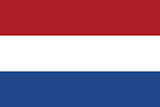
Reise Ramas V. nach Singapur (britisch) und Java (niederländisch).
Abb.: Lage von Singapur und Java
[Bildquelle: OpenStreetMap. -- Creative Commons Lizenz (Namensnennung, share alike)]
Abb.: British Straits settlement mit Singapore
[Bildquelle: The Century atlas of the World. -- New York, 1901]
Abb.: Niederländisch Ostindien, 1899
[Bildquelle: The Century atlas of the World. -- New York, 1901]
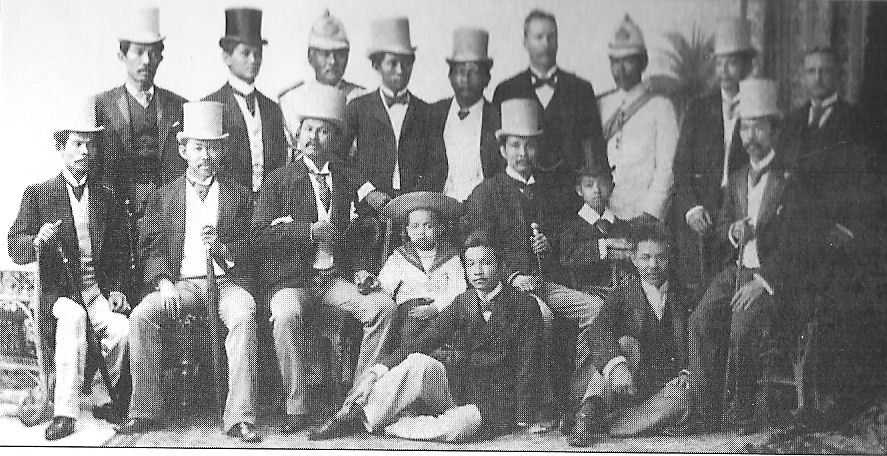
Abb.: Rama V. mit Gefolge in Singapur, 1896-05-17
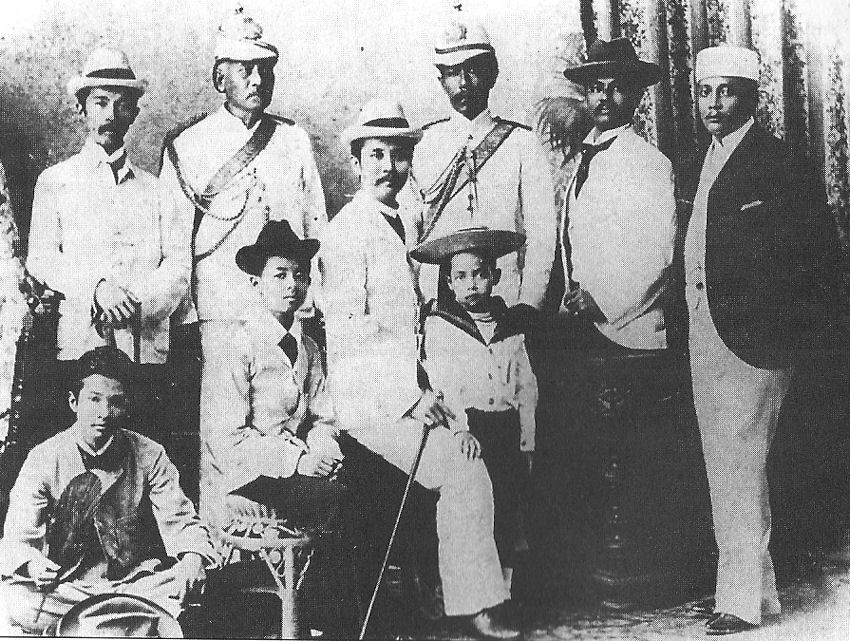
Abb.: Rama V. mit Gefolge in Singapur, 1896-05-17
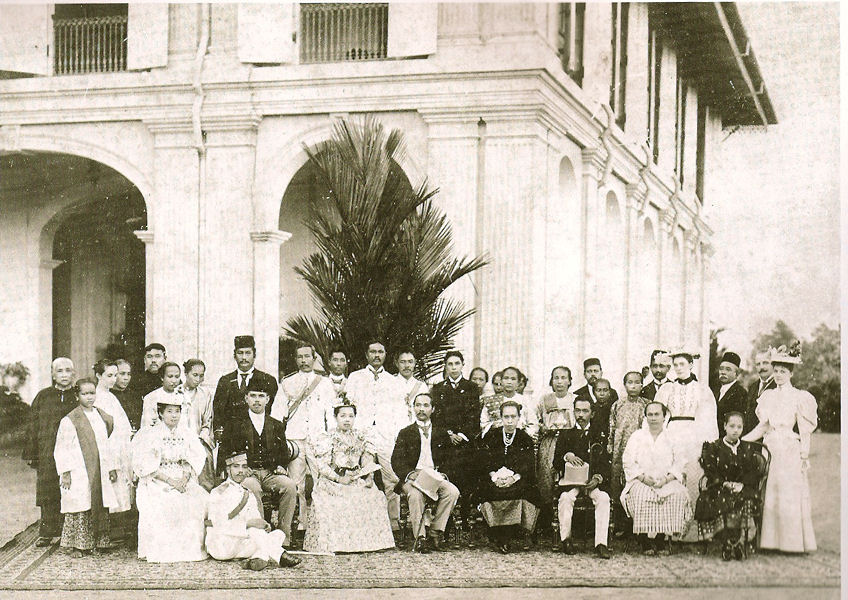
Abb.: Rama V. in Java, 1896
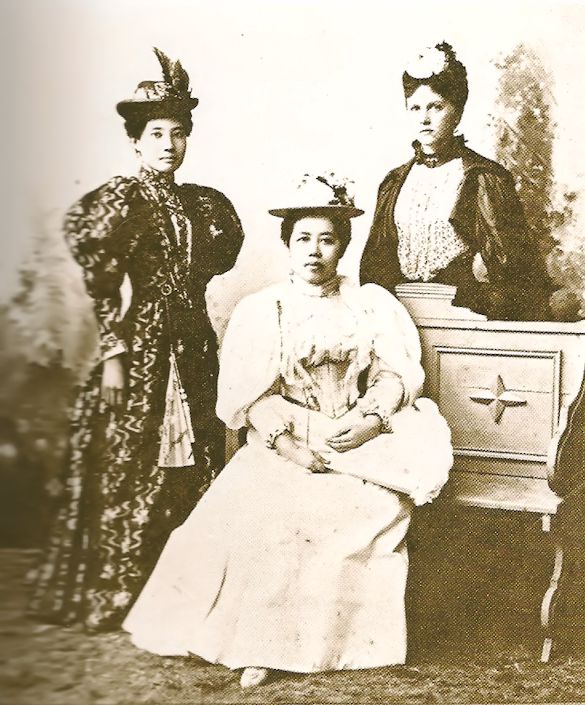
Abb.: Königin Saovabha (เสาวภาผ่องศรี,
1864 - 1919), Lady Chum (ชุม) und Lady Cholayudhyodhin (ชลยุทธโยธินทร์ =
Frau du Plessis de Richelieu, rechts), Java, 1896
1896-06-26

L'Illustration >Paris, Frankreich>:
Abb.: "Les princes siamois en europe". -- In: L'Illustration >Paris, Frankreich>. -- No 2783. -- 1896-06-26. -- S. 532
1896-06-26

Die Aktiengesellschaft Farbenfabriken Friedrich Bayer in Wuppertal-Elberfeld (Deutschland) lassen das Verfahren zur Synthese von Diacetylmorphin (Heroin - (5R,6S)-4,5-Epoxy-17-methylmorphin- 7-en-3,6-diyl)-diacetat) patentieren.
Abb.: Heroinfläschchen
[Bildquelle: Wikimedia. -- Public domain]
Abb.: Heroin
[Bildquelle: Wikimedia. -- Public domain]
Abb.: "Another important element of harm reduction is to offer Methadone Maintenance Therapy (MMT) for people dependent on injected opioids like heroin. Many MMT programs in Thailand don't meet international standards. Most patients are underdosed and, as such, continue to inject. At this center, health personnel were trained to provide MMT in a proper, standardized manner." 2011
[Bildquelle: Trinn Suwannapha / World Bank. -- http://www.flickr.com/photos/10816734@N03/6442293907. -- Zugriff am 2013-09-28. -- Creative Commons Lizenz (Namensnennung, keine kommerzielle Nutzung, keine Bearbeitung)]
1896-07-01


Treaty of Federation der Malaiischen Staaten bildet das britische Protektorat Federated Malay States.
Abb.: Federated Malay States (hell)
[Bildquelle: Twentieth century impressions of British Malaya : its history, people, commerce, industries, and resources / ed. in chief: Arnold Wright. -- London [etc.] : Lloyds, 1908. -- Frontispice]
1896-07-05

Der geschäftsführende Generalgouverneur von Französisch-Indochina, Augustin Juline Fourès (1853 - 1915), erhält vom französischen Gesandten in Bangkok, Jules Albert Defrance (1860 - 1936), eine Liste angeblicher Vertragsbrüche Siams entlang des Mekong (แม่น้ำโขง / ແມ່ນ້ຳຂອງ). Er fordert eine sofortige Invasion Frankreichs in die siamesischen Provinzen Battambang (ក្រុងបាត់ដំបង) und Angkor (អង្គរ), sowie die Besetzung der am Westufer des Mekong gelegenen Teile Luang Prabangs (ຫຼວງພະບາງ). Der französische Kolonialminister André Lebon (1859 - 1938) stimmt zu, wird aber im Kabinett überstimmt.
Abb.: André Lebon
[Bildquelle: Wikimedia. -- Public domain]Trotzdem werden 1.900 europäische französische Soldaten und 2.100 vietnamesische Tirailleure zur Bereitschaft zusammengezogen. (Tirailleure sind in aufgelöster Ordnung kämpfende Mannschaften der Infanterie, auch Plänkler genannt." Wikipedia)
1896-07-14

Der französische Gesandte Jules Albert Defrance (1860 - 1936) feiert demonstrativ mit 3000 französischen protégés (Schützlingen) den französischen Nationalfeiertag. Das wiederholt sich alle zwei Jahre bis 1904.
Abb.: Le 14 juillet à la campagne / von Tadeusz Makowski (1882–1932), 1928
[Bildquelle: Wikimedia. -- Public domain]Brief des französischen Diplomaten Raphaël Réau (1872 - 1928) darüber:
"1896. 15 juillet. Elle est passée, cette journée redoutable du 14 juillet, qui a été un triomphe pour moi, pour Bangkok une surprise, et pour les Siamois une contrariété. Il y a trois ans, le 13 juillet 1893, les Français entraient dans Bangkok, sur trois canonnières, après avoir forcé les passes de Paknam, et M. Pavie, s'il avait été soutenu par le Ministère à Paris, aurait pu dicter des conditions de déchéance aux Siamois. En anniversaire de cette date humiliante pour eux, ils ont, avant-hier, fait arrêter plusieurs protégés français et les ont incarcérés, ce qui a amené une protestation énergique de M. Defrance [Jules Albert Defrance, 1860 - 1936] auprès du gouvernement siamois, et un télégramme pressant à Paris.
De notre côté, Hardouin [Charles Hardouin, Konsul von 1883 - 1904] et moi avons imaginé de faire le lendemain, pour frapper les imaginations populaires, de cette fête française du 14 juillet quelque chose de grandiose, d'unique, de frappant, jusqu'à deux heures de la nuit. J'ai agi, parlé, avec tous les chefs chinois et cambodgiens, dépensant des trésors d'éloquence dans le pauvre vocabulaire siamois que je possède, pour embellir notre fête nationale.
Trois théâtres chinois ont, dès le matin, été dressés dans l'enceinte de la Légation, deux lakhons [ละคร] siamois, et un théâtre cambodgien. Dès le matin des députations nombreuses sont venues saluer le ministre. La Vipère, toute pavoisée, tire des coups de canon qui attirent une foule innombrable dans les rues. De toutes les portes de Bangkok de longues files de Siamois viennent assister aux fêtes que donnent les Fransets. Les théâtres chinois battent leur plein. Charivari immense, et à deux heures de l'après-midi il y a déjà plus de 3.000 personnes. Des tables couvertes de théières et de petites tasses servent de buvettes populaires. Affairé, je m'occupe des illuminations. Orgie de lanternes que l'on apporte. J'organise un service de "lantemiers" avec plusieurs escouades de protégés.
A la nuit, spectacle magnifique. Tout le bord du fleuve est garni de petits verres (7.000) et dans tous les arbres, se croisent à l'infini des lanternes japonaises, des globes lumineux, des feux de bengale illuminant les coins d'ombre. A neuf heures, après le dîner, il y a plus de six mille personnes. On s'écrase. Une rixe de Chinois : la foule reflue. Notre constable arrête plusieurs individus, et le calme revient. Parlons du dîner. Vingt-huit personnes, rien que des Français : dîner comme sait en donner madame Defrance. Discours chaleureux du ministre au dessert. Réponse de l'évêque. La musique du collège de l'Assomption joue en-bas la Marseillaise. Nous nous levons tous respectueusement, et écoutons debout. Après le café nous descendons voir les théâtres, puis le feu d'artifice.
A nul autre pareil, d'une durée d'une heure et demie, il visait à frapper l'imagination. Bombes chinoises qui faisaient trembler la Légation, cascades de feu, jeux de feu, soleils sans cesse renaissants, tout ce que peut faire l'artificier chinois, le plus habile qui soit. Cela a été merveilleux, et c'est un don de la colonie chinoise. Les petits enfants dans quarante ans écouteront leurs grand-mamans parler de ce feu d'artifice, donnant à croire que vingt bouches à feu tonnaient à la fois. M. Defrance n’en revenait pas, et j'ai reçu de sa part moult compliments. Aujourd'hui, un peu malade de tant de fatigues, je me suis retiré chez moi à sept heures de l'après-midi.
Maintenant, que va-t-il arriver ? Paris accordera-t-il carte blanche au ministre pour récupérer les protégés ? Cela tournera-t-il en eau de boudin, comme tant de fois déjà ?
J'attends. Le télégramme Havas nous a appris qu'hier, à la revue, on avait tiré sur Faure [Félix Faure, 1841 - 1899, Präsident Frankreichs], et qu'on l'avait raté. Grande matière à sensation...
Situation très tendue avec les Siamois. Je déménage demain."
[Quelle: Réau, Raphaël <1872 - 1928>: Jeune diplomate au Siam, 1894-1900 : lettres de mon grand-père Raphaël Réau / Philippe Marchat [1930 - ]. -- Paris : L'Harmattan, 2013. -- 246 S. : Ill. ; 24 cm. -- ISBN 978-2-336-29755-2. -- S. 115f.. -- Faire use]
1896-08-08

Der König besucht auf seiner Rückreise von Java Nakhon Si Thammarat (นครศรีธรรมราช):
"On the night of the 8th the King’s yacht arrived outside, and next day he came in, in a great galley, with Prince Damrong [ดำรงราชานุภาพ, 1862 -1943], Prince Rabbi [รพีพัฒนศักดิ์, 1874 - 1920], and others who had been with him to Java. There was a reception in the governor’s quarters ; and his Majesty spoke to all whom he recognised, and fired off among them a number of those terror- creating questions of his. The governor of Lakawn [= Nakhon Si Thammarat / นครศรีธรรมราช], who is generally looked upon as a perfect tyrant in his own province, and holds all men in contempt, was in the royal presence charmingly ill at ease. He shifted from one foot to the other, opened and shut his hands, replying to the searching questions of the King in an undertone, into his boots, and seemed generally thoroughly tame.
His Majesty appeared to be a bit surprised at the small size of the craft commanded by the skipper, but I believe» if he had had half a chance he would have gone for a cruise in her himself. Java, and long rides on the mountain sides, had set him up wonderfully, and he went off walking round the town inspecting everything, visiting all the chief monasteries, and learning all he could of the place.
He left again the same night, and we were then free to continue our work."
[Quelle: Smyth, H. Warington (Herbert Warington) <1867-1943>: Five years in Siam : from 1891 to 1896. -- London : Murray, 1898. -- 2 Bde. : Ill ; 21 cm.. -- Bd. 2. -- S. 105]
1896-08-20 + 1896-12-21 + 1897-01-24

Der französische Gesandte Jules Albert Defrance (1860 - 1936) an den französischen Außenminister Albert Auguste Gabriel Hanotaux (1853 - 1944)
"Defrance wandte sich natürlich energisch gegen die Justizreformen, mit denen Rolin-Jaequemyns die Gerichtsbarkeit zumindest über die asiatischen Untertanen der europäischen Kolonialmächte zurückgewinnen und damit Defrance sein bevorzugtes Machtmittel aus der Hand nehmen wollte. Er klagte Großbritannien an, durch die Unterstützung der Justizreformen die ungleichen Verträge (die er natürlich nicht so nannte) zu unterminieren; noch verwerflicher sei aber die Anmaßung Rolin-Jaequemyns' [Gustave Henri Ange Hippolyte Rolin-Jaequemyns , 1835 - 1902, belgischer Berater], der Siam einen trügerischen Anstrich europäischer Modernität zu geben suche: „Le Siam n’est pas en état d’appliquer par lui-même les réformes judiciaires dont on veut le doter ... en l’état actuel du Royaume la réforme de la justice ... constitue un crime de ,lèse-europe‘."
Dementsprechend verwandte sich Defrance auch gegen die Anstellung eines französischen Beraters im siamesischen Justizministerium, als Rolin-Jaequemyns deswegen in Paris anfragte. Defrance argumentierte:
„Un ,legal adviser' ... français pourrait difficilement servir le Gouvernement, sous la direction de M. Rollin Jacquemyns, avec quelque profit pour nous",
denn er müsse ja am Reformwerk des Belgiers mitarbeiten, statt selber die Richtung zu bestimmen. Rolin-Jaequemyns’ eigentliches Ziel sei es, durch die Anwesenheit eines französischen Beraters den Eindruck zu erwecken, auch Frankreich unterstütze seine Reformen. Defrance wehrte sich auch gegen den Ausbau des siamesischen Eisenbahnnetzes, würde doch die zeitweise geplante Verlängerung der Bahnstrecke Bangkok-Khorat nach Osten der siamesischen Zentralisierungspolitik ein neues Instrument an die Hand geben. Seit dem Abschluss des britisch-französischen Abkommens war der Gesandte auf der Suche nach einem Vorwand zum Abbruch der diplomatischen Beziehungen mit Bangkok."
[Quelle: Petersson, Niels P.: Imperialismus und Modernisierung : Siam, China und die europäischen Mächte 1895 - 1914. -- München : Oldenbourg, 2000. -- 492 S. ; 25 cm. -- (Studien zur internationalen Geschichte ; Bd. 11). -- ISBN 3-486-56506-0. -- Zugl.: Hagen, Fernuniv., Diss., 1999. -- S. 115]
1896-08-26

Der deutsche Ministerresident Hartmann an Reichskanzler Chlodwig Carl Viktor Fürst zu Hohenlohe-Schillingsfürst, Prinz von Ratibor und von Corvey (1819 - 1901)
"Siam bekundete auch Interesse an einer deutschen Anleihe zum Bau der Bahnlinie von Bangkok ins nördlich gelegene Chiangmai [เชียงใหม่], ein Projekt, das der im Sommer 1896 neu ernannte Ministerresident Hartmann wärmstens befürwortete, denn dadurch könne Deutschland „mitten unter den siamesischen Interessenten Platz nehmen und eine Grundlage für weitere Ausbreitung unserer Teilnahme an der Aufschließung dieses so reichen und vielversprechenden Landes gewinnen". Im Auswärtigen Amt hielt man das Projekt jedoch für riskant; „aus politischen Gründen" wollte man zunächst abwarten, ob sich die deutsche Finanz von sich aus für ein solches Projekt interessierte." [Quelle: Petersson, Niels P.: Imperialismus und Modernisierung : Siam, China und die europäischen Mächte 1895 - 1914. -- München : Oldenbourg, 2000. -- 492 S. ; 25 cm. -- (Studien zur internationalen Geschichte ; Bd. 11). -- ISBN 3-486-56506-0. -- Zugl.: Hagen, Fernuniv., Diss., 1999. -- S. 110]
1896-09


Gründung der US-presbyterianischen Missionsstation in Nan (น่าน). 16 Mitglieder. Missionar (bis 1900): Robert Irwin (1859 - 1943)
Abb.: Lage von Nan (น่าน)
[Bildquelle: CIA. -- Public domain]
1896-09-01
Neue Bestimmungen des Erziehungsministerium für die Prüfu8ngen in Standard I (Grundschule). Alle Schulen müssen mindestens die Hälfte ihrer Schüler zur Prüfung bringen, von diesen muss die Hälfte dies Prüfung bestehen. Erfüllt eine Schule diese Anforderung nicht, dann gibt es folgende Sanktionen:
Entlassung des Lehrer
Zusammenlegung der Schule mit einer anderen Schule
Verlegung der Schule
1896-09-10


Der britische Gesandte Maurice William Ernest de Bunsen, 1st Baronet (1852 – 1932) an seine Mutter:
'I counsel every concession to the French within reason and on minor points, but firm resistance to claims destructive of Siamese independence. Rolin-Jaequemyns [Gustave Henri Ange Hippolyte Rolin-Jaequemyns, 1835 - 1902, belgischer Regierungsberater] is too uncompromising, and I think he often does mischief by encouraging the Siamese to resist on all points. That is an attitude which no strong power like France can accept from a small Asiatic nation'. [Zitiert in: Tuck, Patrick J. N.: The French wolf and the Siamese lamb : the French threat to Siamese independence, 1858-1907. -- Bangkok : White Lotus, 1995. -- 434 S. : Ill. ; 22 cm. -- ISBN 974-8496-28-7. -- S. 397, Anm. 16]
1896-09-18
Einrichtung eines Forstdepartements (กรมป่า) zum Schutz der Wälder, besonders der Teak-Wälder. Erster Direktor ist der Brite Herbert Slade, ein Experte des Indian Forestry Department in Burma. Slade handelt mit den britischen Teakholz-Firmen Pachtverträge aus. Diese Verträge
- verbieten das Fällen von Teak-Bäumen unter einer bestimmten Mindestgröße
- erhöhen die Pachtgebühren
- vergrößern die Flächen, auf denen keine Bäume gefällt werden dürfen
"Das Royal Forest Department wurde am 18. September 1896 geschaffen, als die Wälder Siams noch im Überfluss vorhanden waren und jedermann Hartholz und dessen Produkte frei fällen und nutzen konnte, auch für wirtschaftliche Zwecke. Nur Teakholz war von dieser großzügigen Regelung ausgenommen. Für den Einschlag von Teak waren Abgaben an die lokalen Vorsteher zu entrichten, die ihre Aufmerksamkeit aber mehr auf die Eintreibung der Gebühren als auf den Umfang und die Auswirkungen der Holznutzung konzentrierten. Aufgrund der lokalen Gegebenheiten hatten die „Käufer“ - meist britische Staatsbürger - des Öfteren Streitigkeiten mit verschiedenen lokalen Stellen, die sich für die Eintreibung von Gebühren zuständig erklärten. So wurde des Öfteren die Regierung zur Schlichtung der Streitigkeiten eingeschaltet. So zog 1874 die Regierung zunächst das Zustimmungsrecht an sich, so dass jeder Vertrag zwischen dem Käufer und der lokalen Behörde erst durch die Unterschrift einer Regierungsstelle gültig war. In einem Vertrag, der 1893 zwischen Siam und Großbritannien unterzeichnet wurde, wurde unter anderem geregelt, dass britische Bürger (wie seinerzeit die Shan - တႆး und Birmanen - ဗမာလူမျိုး) ohne Zustimmung siamesischer Stellen kein Recht hatten, Teak zu schlagen. In Übereinstimmung mit dem Vertrag wurde im gleichen Jahr in Chiang Mai (ᨩ᩠ᨿᨦᩉ᩠ / เชียงใหม่) eine Kommission eingerichtet, die sich mit den Fragen der Waldnutzung, und insbesondere der des Teakholzes, befassen sollte.
Auf Vorschlag des Briten H. Slade ordnete König Chulalongkorn (Rama V.) 1896 schließlich die Bildung einer zentralen Behörde an, die sämtliche Wälder Siams verwalten sollte. Erster Chefkonservator wurde H. Slade. Er folgte dem Vorgehen der britischen Regierung in Indien und Birma, was die Waldnutzung anbelangt und konnte die anfänglichen Widerstände überwinden, insbesondere auch mit der stetigen Unterstützung des damaligen Mahatthai (กระทรวงมหาดไทย, Innenminister) Prinz Damrong Rajanubhab (สมเด็จพระเจ้าบรมวงศ์เธอ พระองค์เจ้าดิศวรกุมาร กรมพระยาดำรงราชานุภาพ, 1862 - 1943).
Chefkonservatoren des Royal Forest Departments (Auswahl):
- H. Slade (1896–1901)
- T. Tottenham (1901–1904)
- W. F. Lloyd (1905–1925)
- Sanid Pukanan (1927–1937)"
[Quelle: http://de.wikipedia.org/wiki/Royal_Forest_Department. -- Zugriff am 2012-06-20]
1896-09-21
Ministerialerlass von Innenminister Prinz Damrong [ดำรงราชานุภาพ, 1862 -1943] über die Einrichtung der Tambon-Verwaltung (ตำบล)
"In a ministerial circular dated 21st September 1896, Prince Damrong [ดำรงราชานุภาพ, 1862 -1943] himself informed the superintendent commissioners and provincial governors that he considered them to be, 'the grass roots of the administration'. He urged every superintendent commissioner and provincial governor to organize the election of village [ผู้ใหญ่บ้าน] and commune elders [กำนัน] and to transform the petty nobility into district officers. The Prince recommended the optimum size for villages, sub-districts, and districts. He told the provincial governors to ask the heads of approximately ten households, whose houses were situated near one another, to elect a village elder. The governors should then ask the elders of the villages, the number of which should be determined by the radius of three hours' walk between the central and furthest villages, to elect a commune elder. The superintendent commissioner should transform a member of the petty nobility into a district officer, the area of whose jurisdiction should be determined by either the presence of 10,000 people or the radius of twelve hours' walk from the district office to the furthest village. The provincial governor should inform the village elders that they were responsible for the maintenance of the peace, and the commune elders that they were responsible for the inspection of villages and the collection of taxes. The superintendent commissioner should tell the district officers that they were responsible for the maintenance of the peace, the inspection of the villages and sub-districts, the registration of livestock, the deposition of contracts, the settlement of minor disputes, and the collection of taxes."
[Quelle: Tej Bunnag [เตช บุนนาค] <1943 - >: The provincial administration of Siam from 1892 to 1915 : a study off the creation, the growth, the achievements, and the implications for modern Siam, of the ministry of the interior under prince Damrong Rachanuphap. -- Diss. Oxford : St. Anthonys College, Michaelmas Term 1968. -- 429 S., Schreibmaschinenschrift. -- S. 177f. -- Faire use]
1896-09-24
Rama V. eröffnet Hua Lamphong Road (ถนนหัวลำโพง) in Bangkok
1896-10
Gesetz über den Bergbau
1896-10

Der britische Finanzberater Alfred Mitchell-Innes (1864 – 1950) legt einen Bericht vor, in dem er die Mängel der Steuerverwaltung nennt:
es fehlt eine ordentliche Buchführung
es fehlt eine effiziente Kontrollinstanz
die Methoden der Steuererhebung - besonders das tax farming - sind ineffizient: die Steuern sind leicht zu umgehen aber schwer zu erheben
die Armen werden mehr belastet als die Reichen
das Steuersystem steht der Entwicklung des Handels im Wege
Mitchell-Innes schlägt vor, statt dere bisherigen Steuern die Grundsteuern zu erhöhen entsprechend der Produktivität des besteuerten Landes. Die Ausgaben des Königs sollen in einer civil list festgelegt werden.
1896-10

Der britische Gesandte Maurice William Ernest de Bunsen, 1st Baronet (1852 – 1932) an den britische Premierminister, Robert Arthur Talbot Gascoyne-Cecil, 3. Marquess of Salisbury (1830 - 1903):
'I have never, at any time, pressed the Siamese government to employ British subjects. The proposal to do so has, in every instance, come from the Siamese government.' [Zitiert in: Tuck, Patrick J. N.: The French wolf and the Siamese lamb : the French threat to Siamese independence, 1858-1907. -- Bangkok : White Lotus, 1995. -- 434 S. : Ill. ; 22 cm. -- ISBN 974-8496-28-7. -- S. 176]
1896-10-01

Erster Lastkraftwagen, gebaut von Gottlieb Daimler (1834 - 1900)
Abb.: Daimler-LKw, ca. 1896
[Bildquelle: Enslin / Wikimedia. -- GNU FDLicense]
Abb.: Lastkraftwagen mit Zuckerrohr, Loei, 2012
[Bildquelle: Buzz Hoffman. -- http://www.flickr.com/photos/34829087@N06/8537609481. -- Zugriff am 2013-09-19. -- Creative Commons Lizenz (Namensnennung, keine kommerzielle Nutzung, share alike)]
1896-11

Es erscheint
Black, J. S.: Journey round Siam. -- In: The Geographical Journal <London>. -- Vol VIII, no. 5 (1896-11). -- S. 429 - 452 : Ill.
Abb.: Lage von Nongkhai [หนองคาย], Ubon [อุบลราชธานี] und Korat [โคราช]
[Bildquelle: Hdamm / Wikimedia. -- GNU FDLicense]
The whole of the Mekong [แม่น้ำโขง / ແມ່ນ້ຳຂອງ] region beyond 60 miles north and east of Korat [โคราช] is peopled by these Lao, a race who are as much akin almost to our own Shans [တႆး] as to the Siamese. The language differs both in character and sound from Siamese; but, as the Lao country has been under the domination of Siam now for a hundred and twenty years, Siamese is widely understood and spoken. This extensive tract of country suffers from two great and serious evils — the want of inhabitants and isolation.
The want of population may be exemplified by one fact, namely, that the largest town in the whole of the Mekong valley from Pnompenh [ភ្នំពេញ] to Luang Prabang [ຫຼວງພະບາງ] is Nongkhai [หนองคาย], and that place, as I was careful to ascertain, contains between 700 and 800 houses, or any a population—to be liberal in calculation—of about 5000. In Ubon [อุบลราชธานี] there are 632 houses, and Korat [โคราช] is, I should think, somewhat larger. These three towns constitute the great centres of population in the whole of this immense territory. For days and weeks almost, even on the main routes of communication, a traveller will pass villages which number only a few squalid huts, and when I came to a place of two hundred huts it was thought a great event by all my men, for in a metropolis of that size there was some kind of market where they might replenish the camp larder.
Why the population should be so scarce is difficult to say. In olden times war and bloodshed certainly ravaged the country; but now, from my own observation, I should think the principal chock on the growth of population is pestilence. The year of 1895 may have been exceptional, but everywhere I went I saw signs of widespread epidemics of fever, small pox, and cholera. In and around Korat and some other places this was particularly noticeable, as the people have the custom of sticking up in front of a house where there is illness, a little earthenware pot marked with blue or white bands. This was not done out of consideration, it seems, for the neighbours, but was a visible token of supplication for mercy to the demon of fever or cholera. The number of these pots in some places was perfectly alarming, and on more than one occasion we marched right into a village where cholera was rampant.
This region, too, is by nature out off from communication with the outside world. Outlet by the Mekong [แม่น้ำโขง
/ ແມ່ນ້ຳຂອງ] on the east is barred by the precipitous rapids at Khone [ນ້ຳຕົກຕາດຄອນ] (or Khawn, as it is locally pronounced), and what trade there is has always tended in the direction of Korat. The route from Korat to Bangkok, again, is extremely difficult and dangerous, as it passes through a dense and dark forest, which has such a frightful reputation for fever that the name is always mentioned by the Siamese with bated breath—and with good reason too, for it is beyond doubt a moat pestilential and malarious spot. The narrow and tortuous trail can only be traversed by pack-bullocks, and they take ten days to accomplish the journey to Saraburi [สระบุรี], which is within three days of Bangkok by boat.It is by this route that trade is carried on, and, considering the difficulties and cost of transport, it is rather surprising to find that there is any trade at all. Not that it amounts to very much, for, judging roughly in the absence of any reliable statistics, I should not be inclined to estimate the total import and export trade at more than £200, 000 per annum, 'The imports consist, as usual, principally of cotton cloth and a few other articles of clothing, brass dishes and crockery, and the exports of cardamums, raw silk, gum benjamin, cattle, and hides. On account of this isolation, the inhabitants do not seem to possess that instinct for trade which renders a country valuable. They grow their own rice and tobacco, weave their own clothes of silk and cotton, and in many places, have not even got beyond a system of barter for their few wants, and of paying their taxes in kind."
[a.a.O., S. 439f.]
1896-11-16

Der britische Gesandte Maurice William Ernest de Bunsen, 1st Baronet (1852 – 1932) an Francis Leveson Bertie, 1st Viscount Bertie of Thame (1844 - 1919), Beamter im Foreign Office, darüber, wie sehr sich Frankreich in Siam isoliert hat:
„Indeed the French are in a pitiable position here — completely out of everything, socially or commercially" [Zitiert in: Petersson, Niels P.: Imperialismus und Modernisierung : Siam, China und die europäischen Mächte 1895 - 1914. -- München : Oldenbourg, 2000. -- 492 S. ; 25 cm. -- (Studien zur internationalen Geschichte ; Bd. 11). -- ISBN 3-486-56506-0. -- Zugl.: Hagen, Fernuniv., Diss., 1999. -- S. 116]
1896-11-18
Rama V. eröffnet den Khlong Rangsit (คลองรังสิต) der „Siam Land, Canals, and Irrigation Company“ (SLCIC)
Abb.: Lage des Khlong Rangsit (คลองรังสิต)
[Bildquelle: OpenStreetMap. -- Creative Commons Lizenz (Namensnennung, share alike)]
Abb.: Khlong Rangsit (คลองรังสิต)
[Bildquelle: Heinrich Damm / Wikipedia. -- GNU FDLicense]
Abb.: Khlong Rangsit - คลองรังสิต
[Bildquelle: Paul 012 / Wikipedia. -- Creative Commons Lizenz (Namensnennung, share alike)]
1896-11-19
Beginn des Schiedsgerichtsverfahrens wegen der Korat-Eisenbahn.
1896-11-20

Der französische Gesandte Jules Albert Defrance (1860 - 1936) an den französischen Außenminister Albert Auguste Gabriel Hanotaux (1853 - 1944):
"Defrance unterstützte nicht nur wie Pichon [Stéphen Jean Marie Pichon, 1857 - 1933, französischer Gesandter in Peking, 1897 - 1900], ein régime anticivilisatrice, er betrieb seine eigene politique anticivilisatrice. Ganz folgerichtig sah Defrance dann auch das „traditionelle" Siam nicht als rückständig, arm, korrupt etc. an. Vielmehr verdammte er sämtliche Veränderungen, die Chulalongkorn seit seinem Regierungsantritt im Jahre 1873 eingeleitet hatte, und sang das Loblied des
ancien régime:partir du jour où le Roi actuel eut atteint sa majorité, des modifications profondes ont été introduites dans les règles et les coutumes du royaume: jadis, les Rois de Siam s’entouraient de mandarins qui, grâce à leurs capacités, ... aux services rendus au pays, s’élevaient peu à peu aux plus hautes dignités ... Maintenant, au contraire, ... les fonctions importantes ... sont presque exclusivement réservées aux princes ... aucune capacité ou aptitude spéciale ne leur est nécessaire"."„A
[Quelle: Petersson, Niels P.: Imperialismus und Modernisierung : Siam, China und die europäischen Mächte 1895 - 1914. -- München : Oldenbourg, 2000. -- 492 S. ; 25 cm. -- (Studien zur internationalen Geschichte ; Bd. 11). -- ISBN 3-486-56506-0. -- Zugl.: Hagen, Fernuniv., Diss., 1999. -- S. 140]
1896-12-07

Siam war gezwungen worden, ca. 20.000 Khmu (ຂະມຸ / ขมุ) ressortissants, Emigranten aus Luang Prabang (ຫລວງພະບາງ), als Untertane Frankreichs anzuerkennen. Die Kha arbeiten in der britischen Teakholzindustrie Nordsiams. Der französische Gesandte Jules Albert Defrance (1860 - 1936) hofft dadurch das britische Teakholzmonopol brechen zu können. Er schreibt an den französischen Außenminister Albert Auguste Gabriel Hanotaux (1853 - 1944):
'Je crois sincèrement que si ce projet réussit, il portera un coup terrible à l'influence anglaise dans les districts de Xieng Mai [Chiang Mai - เชียงใหม่], Lakhone [ละคร = Lampang - ลำปาง], Phrae [แพร่], Nan [น่าน] etc.... Nous y deviendrions prépondérants surtout avec nos Khamouens [ຂະມຸ / ขมุ] .... La constitution et le fonctionnement d'une compagnie de ce genre est ce qui pourrait nous donner le plus d'influence dans ce pays après la reconnaissance par le gouvernement siamois de notre droit complet de protection. C'est tout dire. Ainsi je vous recommande cette affaire tout, tout spécialement.' [Zitiert in: Tuck, Patrick J. N.: The French wolf and the Siamese lamb : the French threat to Siamese independence, 1858-1907. -- Bangkok : White Lotus, 1995. -- 434 S. : Ill. ; 22 cm. -- ISBN 974-8496-28-7. -- S. 388, Anm. 49]
Abb.: Lage der genannten Provinzen
[Bildquelle: CIA. -- Public domain]
ausführlich: http://www.payer.de/thailandchronik/ressourcen.htm
Phongpaichit, Pasuk <ผาสุก พงษ์ไพจิตร, 1946 - > ; Baker, Chris <1948 - >: Thailand : economy and politics. -- Selangor : Oxford Univ. Pr., 1995. -- 449 S. ; 23 cm. -- ISBN 983-56-0024-4. -- Beste Geschichte des modernen Thailand.
Feeny, David <1948 - >: The political economy of productivity : Thai agricultural development 1880 - 1975. -- Vancouver : University of British Columbia Press, 1982. -- (Asian studies monographs ; 3). -- Zugl.: Diss. Univ. of Wisconsin-Madison. -- 238 S. ; 24 cm.
Ingram, James C.: Economic change in Thailand 1850 - 1870. -- Stanford : Stanford Univ. Pr., 1971. -- 352 S. ; 23 cm. -- "A new edition of Economic change in Thailand since 1850 with two new chapters on developments since 1950". -- Grundlegend.
Akira, Suehiro [末廣昭] <1951 - >: Capital accumulation in Thailand 1855 - 1985. -- Tokyo : Centre for East Asian Cultural Studies, ©1989. -- 427 S. ; 23 cm. -- ISBN 4896561058. -- Grundlegend.
Skinner, William <1925 - 2008>: Chinese society in Thailand : an analytical history. -- Ithaca, NY : Cornell Univ. Press, 1957. -- 459 S. ; 24 cm. -- Grundlegend.
Mitchell, B. R. (Brian R.): International historical statistics : Africa and Asia. -- London : Macmillan, 1982. -- 761 S. ; 28 cm. -- ISBN 0-333-3163-0
Kludas, Arnold <1929 - >: Die Seeschiffe des Norddeutschen Lloyd 1857 bis 1970. -- Augsburg : Bechtermünz, 1998. -- 165 + 168 S. : Ill ; 28 cm. -- ISB 3-86047-262-3. -- Standardwerk.
Ongsakul, Sarassawadee <สรัสวดี อ๋องสกุล>: History of Lan Na / translated by Chitraporn Tanratanakul. -- Chiang Mai : Silkworm, 2005. -- 328 S. : Ill. ; 23 cm. -- ISBN974-9575-84-9. -- Originaltitel: ประวัติศาสตร์ลัานนา (2001)
Barmé, Scot: Woman, man, Bangkok : love, sex, and popular culture in Thailand. -- Lanham : Rowman & Littlefield, 2002. -- 273 S. : Ill. ; 24 cm. -- ISBN 0-7425-0157-4
Van Beek, Steve <1944 - >: Bangkok, then and now. -- 2. ed. -- Nonthaburi : AB Publications, 2001. -- 131 S. : Ill. 22 x 29 cm. -- ISBN: 974-87616-0-6
ศกดา ศิริพันธุ์ = Sakda Siripant: พระบาทสมเด็จพระจุลจอมเกล้าเจ้าอยู่หัว พระบิดาแห่งการถ่ายภาพไทย = H.M. King Chulalongkorn : the father of Thai photography. -- กรุงเทพๆ : ด่านสุทธา, 2555 = 2012. -- 354 S. : Ill. ; 30 cm. -- ISBN 978-616-305-569-9